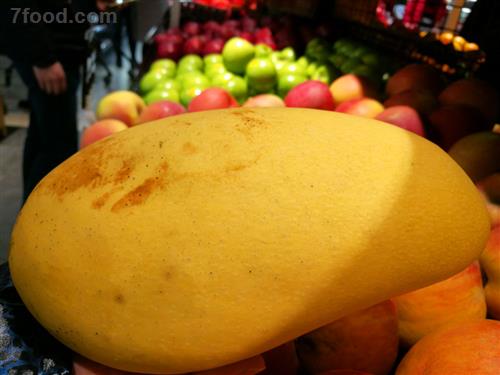The nutritional value of mango
The nutritional value of mango fruits is extremely high, vitamin A content is 3.8%, vitamin C content also exceeds oranges and other fruits. Mango has protein, calcium, glycosides, yttrium iron and other essential components of the human body. According to the analysis of mango production areas, mango soluble solids ranged from 14% to 24.8%, sugar content was 11% to 19%, protein was 0.65% to 1.31%, and carotene contained 2281-6304 micrograms per 100 grams of pulp. Calcium, strontium, potassium, and other essential trace elements are also very high.
Mango has beneficial effects on stomach, vomiting, and dizziness. It is effective for vertigo, Meniere's syndrome, high blood pressure dizziness, nausea and vomiting. In ancient times, people who floated across the oceans all carried some mangoes to solve the symptoms of seasickness. Flesh or eating mango Jianshui also has a good effect in suppressing pregnant women's nausea.
Mango can lower cholesterol, triglycerides, regular food is beneficial to the prevention and treatment of cardiovascular diseases.
Mango has the effect of dysentery and cough, and has an auxiliary therapeutic effect on cough, expectoration, and asthma. Mangoes contain compounds such as mango keto acid and have pharmacological effects against cancer. The juice of mango can increase gastrointestinal motility and shorten the residence time of feces in the colon. Therefore, it is beneficial to the prevention and treatment of colon cancer.
Women's beauty can also be selected for mangoes, because the content of mango carotenoids is particularly high and can nourish the skin. Carotene is also very good for eyesight. In addition, mango can delay cell aging and improve brain function because it has obvious anti-lipid peroxidation and protective effect on brain neurons, which can significantly increase red blood cell catalase activity and reduce red blood cell hemoglobin. It also has the effect of dysentery and cough, and has ancillary therapeutic effects on cough, sputum, and asthma.

What circumstances can not eat mango?
1. First of all, people with asthma cannot eat mangoes. Regardless of whether they are Chinese medicine or Western medicine, they have included mangoes in the list of asthma taboos.
Second, people who have an allergic reaction to paint cannot eat mango. Mango is a plant of the lacquer family and contains monohydroxybenzene or dihydroxybenzene components. The composition contained in the paint in peacetime is somewhat similar. It has a great irritant effect on the mucous membrane of the skin and is particularly prone to cause allergies.
3, In addition, mango nature of wet toxicity, suffering from skin diseases or tumors recommend not to eat mango. If the body is wet, skin diseases such as eczema, sore pus, gynecological diseases such as leucorrhea, medical problems such as edema, athlete's foot, etc., Chinese medicine are called wet, then eat foods like wet mangoes, it is possible It will make the disease worse.
4, not all patients with cough can not eat mango, Deficiency cough (throat itch white) patients do not eat the best, the disease has a certain impact.
5, due to the high sugar content of mango, so diabetics should not eat.
6, can not eat mango after eating. Mangoes must not be eaten together with garlic and other spicy substances, otherwise it may cause yellowing.
7, mango and wine can not be the same food: mango and wine are spicy food, eat more harmful to people's kidneys.
8, mango and seafood can not be eaten together: both at the same time to eat is not easy to digest, and both mango and seafood are allergic foods, if the same food, it is prone to allergies.
Monosodium Glutamate 98%(MSG)
Fructose Syrup,Glucose Fructose Syrup Gluten,Best High Fructose Corn Syrups,High Fructose Corn Syrup 42
JILIN COFCO BIO-CHEM AND BIO-ENERGY MARKETING CO., LTD , https://www.cofco-biotech.com